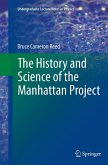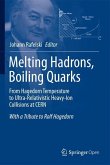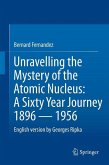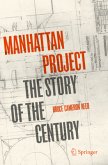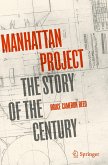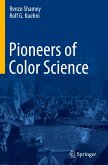The development of atomic bombs under the auspices of the U.S. Army's Manhattan Project during World War II is considered to be the outstanding news story of the twentieth century. In this book, a physicist and expert on the history of the Project presents a comprehensive overview of this momentous achievement. The first three chapters cover the history of nuclear physics from the discovery of radioactivity to the discovery of fission, and would be ideal for instructors of a sophomore-level "Modern Physics" course. Student-level exercises at the ends of the chapters are accompanied by answers. Chapter 7 covers the physics of first-generation fission weapons at a similar level, again accompanied by exercises and answers. For the interested layman and for non-science students and instructors, the book includes extensive qualitative material on the history, organization, implementation, and results of the Manhattan Project and the Hiroshima and Nagasaki bombing missions. The reader also learns about the legacy of the Project as reflected in the current world stockpiles of nuclear weapons.
This second edition contains important revisions and additions, including a new chapter on the German atomic bomb program and new sections on British and Canadian contributions to the Manhattan project and on feed materials. Several other sections have been expanded; reader feedback has been helpful in introducing minor corrections and improved explanations; and, last but not least, the second edition includes a detailed index.
This second edition contains important revisions and additions, including a new chapter on the German atomic bomb program and new sections on British and Canadian contributions to the Manhattan project and on feed materials. Several other sections have been expanded; reader feedback has been helpful in introducing minor corrections and improved explanations; and, last but not least, the second edition includes a detailed index.
"It's accessible and easy to read but covers all the interesting aspects of the Manhattan Project starting with the fascinating scientists and other people that were involved in the project ... . I found this book delightfully inclusive and very detailed and as such a perfect book to read if you're interested in the Manhattan Project in general." (AstroMadness.com, May, 2018)
"This new text by Cameron successfully marries the science with the history of the Manhattan Project in 472 pages and 173 illustrations (most of them original). ... I definitely recommend this book to anyone who is interested in learning about the history of the Manhattan Project and all the nuclear physics behind the project, which is written in a very approachable and educational way." (Dimitris Mihailidis, Medical Physics, Vol. 41 (9), September, 2014)
"Reed (Alma College) provides a well-written scientific, organizational, military, and diplomatic history of the American (and British!) programs leading to the construction and use of the world's first nuclear weapon. ... The book, part of Springer's 'Undergraduate Lecture Notes in Physics' series, is well suited for undergraduates and others who have successfully completed a good introductory college physics course. ... Summing Up: Recommended. Upper-division undergraduates and above; general readers." (A. M. Saperstein, Choice, Vol. 51 (9), May, 2014)
"This work, published in the Springer Undergraduate Lecture Notes in Physics series, is intended as a college-level science text on the Manhattan Project, but serves well as a resource for scientists and non-scientists. ... Each chapter concludes with problems for students and an extensive bibliography." (ALSOS Digital Library for Nuclear Issues, alsos.wlu.edu, 2014)
"This new text by Cameron successfully marries the science with the history of the Manhattan Project in 472 pages and 173 illustrations (most of them original). ... I definitely recommend this book to anyone who is interested in learning about the history of the Manhattan Project and all the nuclear physics behind the project, which is written in a very approachable and educational way." (Dimitris Mihailidis, Medical Physics, Vol. 41 (9), September, 2014)
"Reed (Alma College) provides a well-written scientific, organizational, military, and diplomatic history of the American (and British!) programs leading to the construction and use of the world's first nuclear weapon. ... The book, part of Springer's 'Undergraduate Lecture Notes in Physics' series, is well suited for undergraduates and others who have successfully completed a good introductory college physics course. ... Summing Up: Recommended. Upper-division undergraduates and above; general readers." (A. M. Saperstein, Choice, Vol. 51 (9), May, 2014)
"This work, published in the Springer Undergraduate Lecture Notes in Physics series, is intended as a college-level science text on the Manhattan Project, but serves well as a resource for scientists and non-scientists. ... Each chapter concludes with problems for students and an extensive bibliography." (ALSOS Digital Library for Nuclear Issues, alsos.wlu.edu, 2014)


